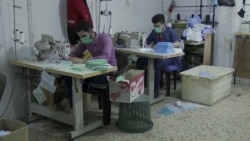As the coronavirus pandemic continues to slow businesses in the blockaded Gaza Strip, a small factory in the enclave is firing up its production to help supply for a face mask shortage in Israel.
Shehada Factory was devoted to making clothes for Palestinians and for Israeli markets before March when Hamas militant group imposed strict restrictions due to the pandemic. Using raw material provided by Israeli merchants, the garment factory has now pivoted its business to produce 50,000 face masks per day— all of which are exported to Israel.
“The Israelis are in need of surgical face masks, and in the Gaza Strip we need to employ as many workers as possible to ease the harsh economic conditions,” the 55-year-old factory owner, Hasan Shehada, told VOA.
Before the spread of coronavirus, Shehada said his factory used to work at a rather slow pace producing clothes for local and Israeli markets. But it is now thriving as more than sixty of its workers strive each day to meet Israel’s high demand for face masks.
As of Wednesday, Israel has reported over 16,600 confirmed cases of coronavirus, with 2884 active cases and 279 deaths. The Israeli government this week eased its social distancing measures in a move that officials said was to help the country’s education system.
West Bank and Gaza have registered only 391 cases of coronavirus, with 20 confirmed cases in Gaza. However, the economic fallout of the virus has cast a shadow on the coastal enclave which has been suffering for years as a result of the conflict with Israel.
Human Framework
Shehada said economic relations between Israel and Gaza were about “mutual interests” on both sides, adding that the spread of the coronavirus has prompted “everybody to deal with others within a human framework.”
He said the spike in the factory’s production has resulted in other unusual buyers, including Palestinian businesspeople based in the United States. The U.S. buyers have asked him to supply them with a million face masks.
“Despite limited resources and capabilities, the Gaza Strip is producing surgical face masks at the international level and has become a competitor in the market,” charged Shehada.
Muhammad, a 40-year-old worker at the factory and father of seven, told VOA that the spread of coronavirus has unexpectedly improved the economic situation of his family.
“Over the past years, we have been working intermittently when there were orders, but now there is a boom,”’ he said.
Expressing hope that Shehada factory could continue exporting to Israel even after the pandemic, he said his daily wage has improved and he is now allowed to work overtime to gain extra money.
As simple as they come, these hopes remain contingent on the political situation in the volatile region.
Since 2016, Israel has allowed some Gaza factories to produce clothes for its markets. Factories like Shehada obtain raw materials from Israeli merchants via Gaza’s sole commercial crossing, the Kerem Shalom. The crossing has been frequently closed in the past when tensions intensified between Israel and Hamas.
2 Million
Nearly 2 million people live in the Gaza Strip which came under the control of U.S.-designated terror group Hamas in 2007 after the militant group took over by force from troops loyal to Fatah group. Since then, an Israeli blockade and internal Palestinian division in the enclave have led to a severe humanitarian deterioration and economic decline.
An estimated 4,000 factories and economic facilities had been shut down or destroyed since the 2007 conflict, leaving approximately 255,000 people unemployed. Local reports say direct and indirect economic losses of the coastal enclave could be more than a billion U.S. dollars per year.
Public Information Officer of Gaza’s Chamber of Commerce and Industry, Maher al-Tabaa’, said he hoped Israeli imports from Gaza could be the beginning of a new trend in trade relations.
“This will help amend the negative trade balance,” he said, applauding Palestinian clothing factories that used the pandemic to shift their production focus.
However, according to economic expert Yasser al-Alam, the face mask exports to Israel are temporary with minimal potential to improve commercial exchange between Israel and the Gaza Strip.
“This limited boom serves factory owners only, and its impact on Gaza’s economy in general is zero,” al-Alam told VOA.
The expert anticipated the trade exchange between the two sides will most likely end after the coronavirus pandemic.





